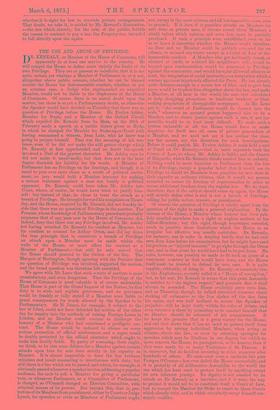TOPICS OF THE DAY.
MR. DISRAELI ON ENGLISH TENANT-RIGHT.
THE meeting on Tuesday, between the " Farmers' Club " organ- ised as a deputation and Mr. Disraeli, may prove a most important event, and seriously affect the politics of the future. Mr. Disraeli, who asked his visitors to be seated, " that they might talk more at their ease," and wore for the occasion his very best and most gracious manner, told the deputation that the Government were " at this very moment "intending to legis- late on " Tenant-right ; " that a Government which, when so legislating, did not fully consider the Lincolnshire Custom—that Is—the custom of paying the out-going tenant for all unex- hausted improvements—would be very foolish, and that he believed his Bill "would give great and general satisfaction to the Farmers of the United Kingdom." If Mr. Disraeli's words could be judged like the words of any other Minister, these phrases would imply that Government intended to make the Lincolnshire Custom law throughout the Three Kingdoms, and in that case no doubt the farmers would be very full of contentment, and very much inclined to regard the Tory party as their own. They would have a security for their capital and for their personal independence, which most of them regard as better than a lease. It is not a perfect security, for no doubt a wealthy landlord, indignant at a tenant's independence, could give him notice to quit, and either find a new tenant who would pay the fine or take the farm into his own hands, but still the Custom gives the tenant much more security than he previously enjoyed. Landlords do not like paying fines, or seeing farms unlet, or working them on their own account, and under the Lincolnshire Custom think twice before they evict a man who, whether they like him or not, pays his rent to Vie day, and while let alone is not exacting about improvements, but makes them when he wants them, for himself. That kind of man fills the Manor-house treasury, and every landlord, however rich, has for a paying tenant something of the feeling with which a Chancellor of the Exchequer regards a tax that draws. He is reluctant to bring that state of affairs to a close, particularly if he is fined for so bringing it, and a tenant with right to compensation may therefore invest his capital as securely in his farm as in any other business. He is pretty sure to enjoy his profits as long as he likes, and if he departs, or is evicted, or dies, he gets most of it back again. He is, in fact, though not as secure as a freeholder, as secure as an ordinary trader, which is all he can expect.
But we find it very difficult to believe that a Parliament made up chiefly of squires, with titles or without, intend to make a concession to farmers so great as Mr. Disraeli's words would seem, at first sight, to imply. The landlords may grant compensation as the principle of law in the absence of contract, for they are well aware they would get more rent and better culture and improved farms, and they like all these things very much ; but if they place law above contracts they will have to part with power, and they do not like this at all. The power over all around you which a large block of land confers on its owner has hitherto attracted them more than any increase of income. They feel as if their dignity and their honour and their personal comfort would all be impaired by any decrease in their authority over their own tenants. They cannot hang them, or fine them, or scold them at pleasure, but they can "banish" them, to use Mr. Carlyle's euphuism for eviction, and that power, often very real, and on some estates irresistible, warms their hearts with a sense of prestige. The Times of Wednesday openly says that it is the reason for holding land, that without it the enjoy- ment of property would be gone, and that to take it away would involve the greatest of Revolutions. We do not per- ceive that Lincolnshire landlords are uncomfortable, or that Irish landlords wear sackcloth, or that the owners of the West End fret much under their inability to evict at will, but we will not employ any of those illustrations. We will concede that the squirearchy will, as a body, agree with the Times, that the irresponsible right of banishment is very pleasant to owners, and that the measure involves, if not a Revolution, a considerable social change, and we ask what then ? Many powers have been very pleasant to many classes, and have been abrogated nevertheless, to the infinite benefit of the people. The hereditary jurisdictions were very pleasant to those who held them, but they were taken away. The right to prevent combinations was very pleasant to employers of labour, but it was abrogated without compensation. Tho old rights of house- holders over servants, and of masters over apprentices, and of creditors over debtors, were very grateful to those in whom they were so long vested, but most of them have disappeared, and the rest of them are disappearing, amid universal approval. Every one of these " enjoyments" was enjoyed by the few at the expense of the many, and when it ceased the many found their enjoyments increased. The power of banishment considered as pleasure belongs entirely to that class of enjoyments, and if it has no other defence, ought with them to be legally extinguished. It is, in fact, a power to inflict a capricious injury because you are rich, and ought from that point of view to disappear. There is not an argument in its favour which the Times puts forward that would not justify hereditary jurisdictions, or the right of a landlord to evict without giving any notice at all.
Oh ! but," the Squires will tell us, " we do not go so far as the Times? We are not defending our enjoyments because they are enjoyable, but because they are ours. We have a right to do as we like with our own. The privilege of free contract is sacred, is embodied in all our legal system, and belongs as much to us as to any other dealers." That argument sounds oddly in the mouths of men who for generations refused to the people the right of contracting freely for their own bread, but we may assume them all to have seen the error of their ways in that matter, and then ask them gravely what it it is they mean ? Where and when was the principle of free contract established in our laws ? Is it not the first principle of those laws that a con- tract contrary to public policy is ipso facto void,—that is, that the general good of the whole people, as understood by Parliament or the Judges, is above freedom of contract ? Are not entire series of contracts voided every week, on the distinct ground that a man cannot contract himself out of the law,— that, to take the most frequent illustration, Railway Companies cannot agree to cease to be common carriers, or contract to pay no damages if people are killed on their lines by their default ? Mr. J. Howard, so often Mr. Read's supporter on agricultural questions, said on Monday that the law positively bristled with restrictions on freedom of contract, one of them in particular prohibiting free pecuniary contract between landlord and tenant-farmer. " The Common Law, as well as the Courts of Equity, had ruled that contracts must not con- travene the common good, and the Merchant Shipping Act, the Railway Acts, the Truck Act, the Abolition of Purchase in the Army, the Factories and Mines Acts, the Statutes of Frauds and Limitations, were among examples of Parliamentary restraint of freedom of contract, and by the Property-tax Act Parliament distinctly declared that in making contracts the tenant did not meet his landlord on fair terms ; and surely, he added, a Parliament of landowners must be considered judges on the point.' " If there is a principle in English legislation, it is that the public welfare overrides private arrangement ; and if compensation for farming improvements is for the public good, the sacredness of arrangements between landlord and tenant prohibiting compensation becomes an empty phrase.. Whether such compensation is for the public good is, of course, a matter for Parliament to decide ; but it must be decided on grounds of expediency, and not in deference to the imaginary sacredness of a principle which our laws in- cessantly override. As far as we can perceive, the whole balance of evidence is in favour of the expediency. The best landlords, the ablest farmers, the highest experts in agriculture, all agree that the tenant who farms highest produces most crop, that the higher the farming the greater the necessity for seeming the capital required and that the easiest way of conferring security is to pay for unexhausted improvements. The consensus of opinion upon those points is nearly perfect, and would, indeed, be conceded by any Bill arranging for such payments, in the absence of contracts to the contrary ; and the objections must therefore be based either upon the moral right to freedom of contract, which is purely imaginary, or upon the public utility of the power of banishment at discretion now lodged in the owners of the soil. We shall not, we conceive, even in this Parliament hear much of the latter argument, and predict that it is round the I former the debate will rage. The spokesmen of the " Farmers' Club " see that very clearly, and so we do not doubt will the farmers themselves,—and they are beginning to be aware that Cambridgeshire is not the only county where the election is in their own hands. They will be well aware that " freedom of contract " will make the law inoperative, they know that the cry of confiscation is non- ; sense—for security increases rents—and their only doubt will be



































 Previous page
Previous page